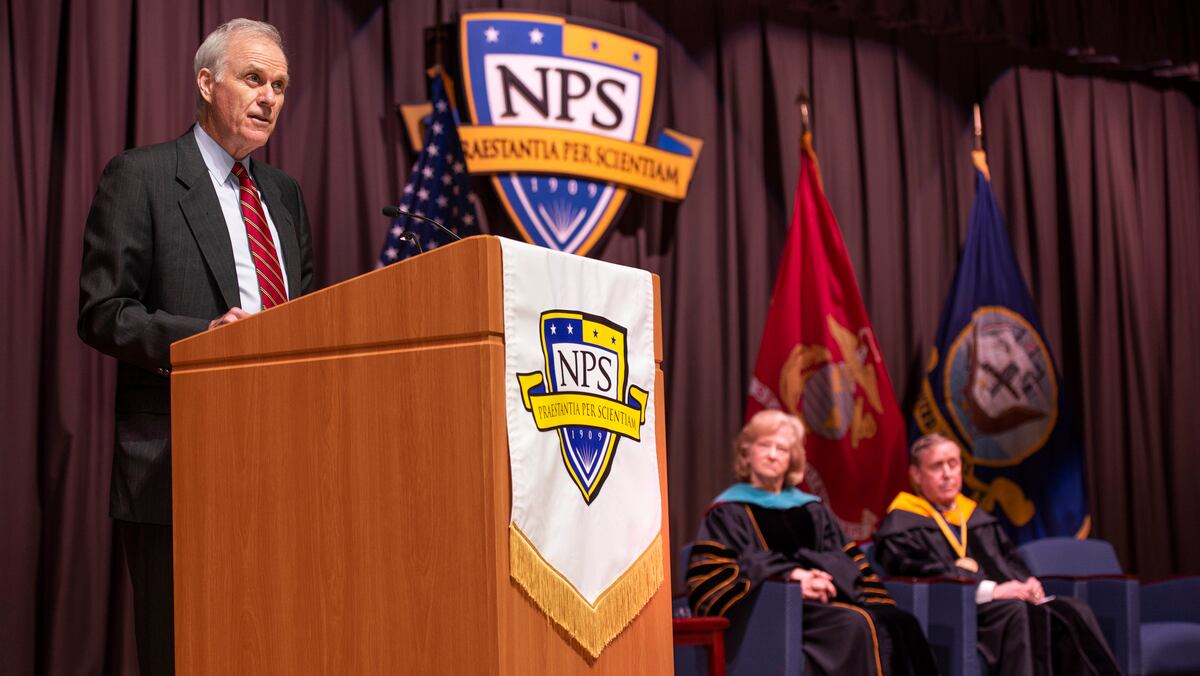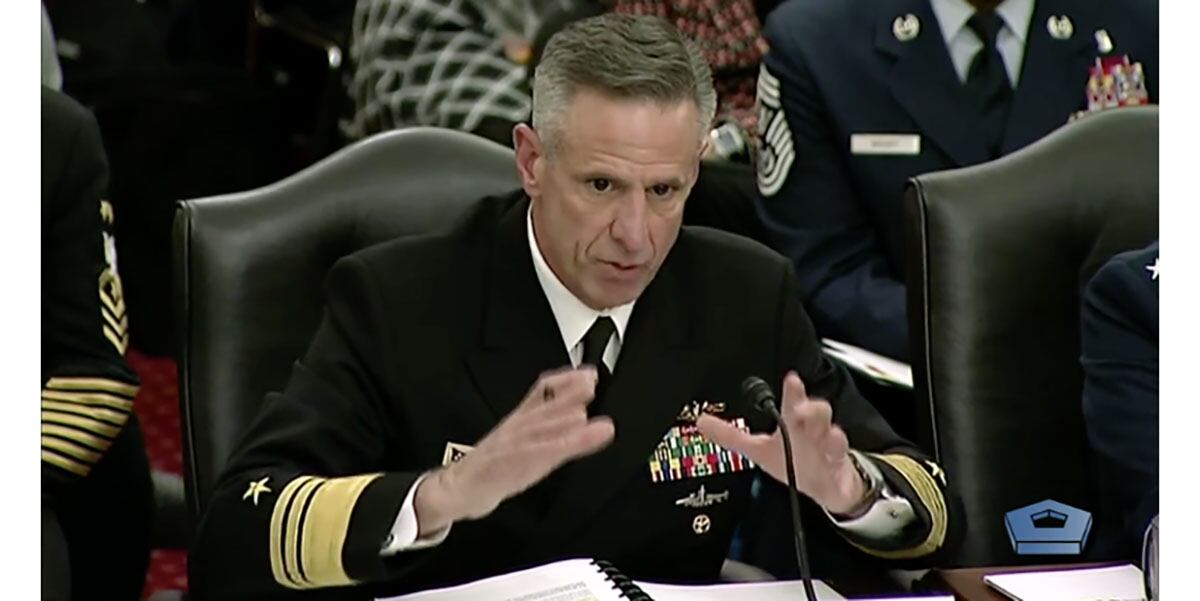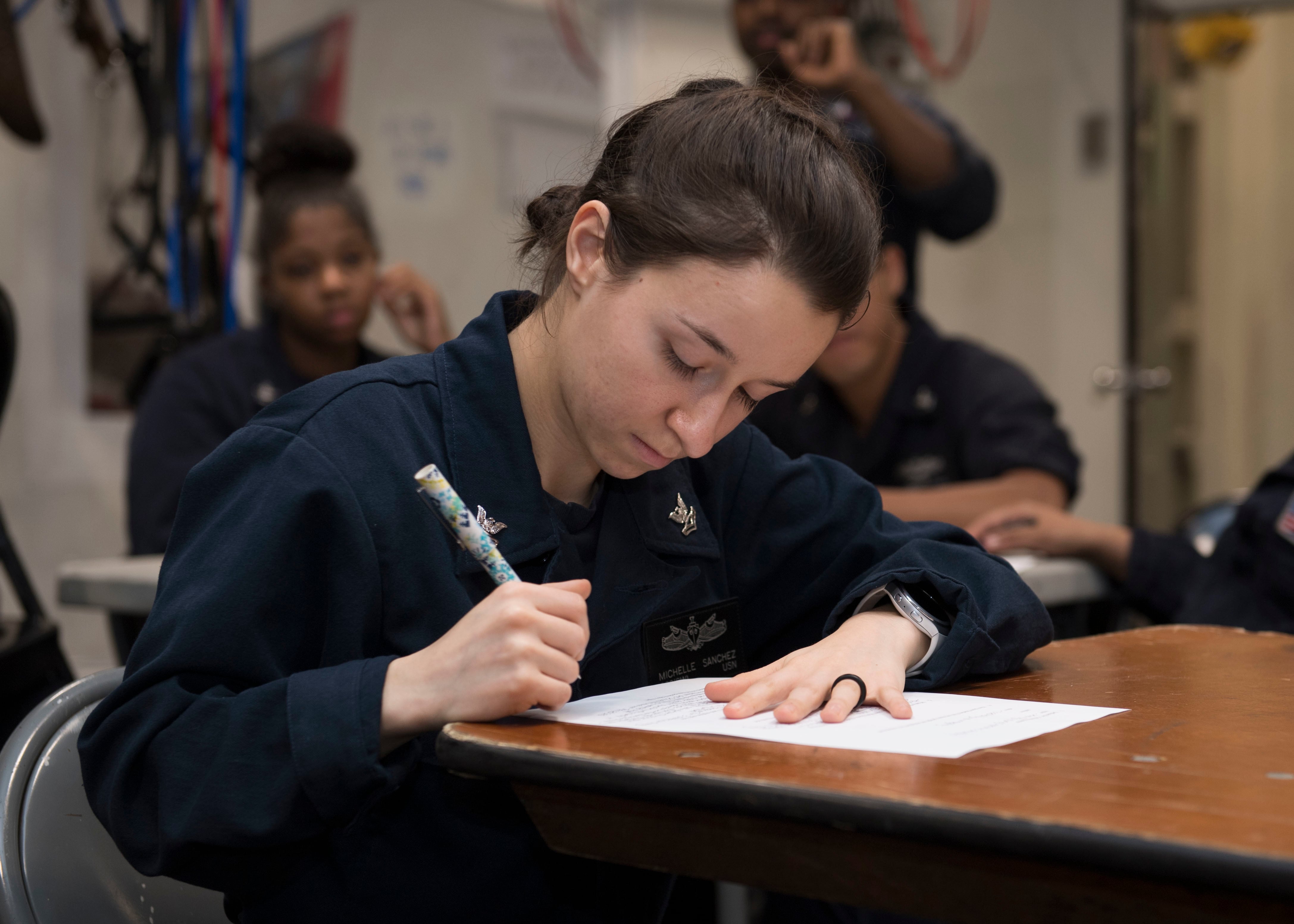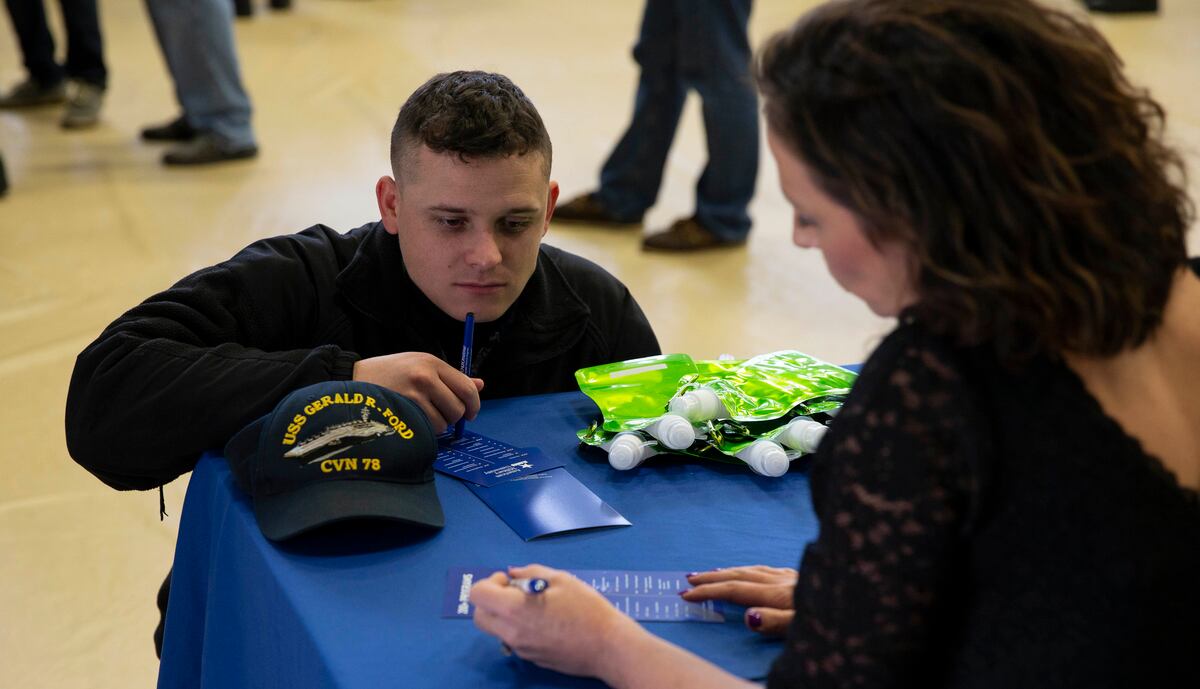Strongly championed by ex-Navy Secretary Richard V. Spencer, the Naval Community College will survive his demise, officials said this week.
Depending on whether you believe his version of the story or not, Spencer either resigned in protest over President Donald J. Trump’s intervention in a botched case against a SEAL or was forced to exit the Pentagon for hypocritical double-dealing on sham Naval Special Warfare proceedings behind the back of his boss, Defense Secretary Mark Esper.
But the Navy’s newest school house will survive the Spencer scandal — and it won’t even be a school house at all.
Navy spokesman Cmdr. Clay Doss told Navy Times by email that it appears “work continues as before.”
Eight months ago, Spencer began establishing a full-accredited Naval Community College. It was a top priority under his larger plan to revamp how the service educates sailors and Marines throughout the ranks.
Perhaps the first step in hiking efforts was Spencer’s pick of John Kroger as the service’s first chief learning officer. For now, he reports directly to Acting Navy Secretary Thomas Modly and will work alongside Vice Adm. Stuart Munsch, the Chief of Naval Operations’ new Director of Warfighting Development, or “N7,” which was created to elevate and refocus education.
The team also includes Lt. Gen. Eric Smith, the Marine Corps’ Deputy Commandant for Combat Development and Integration.
RELATED

Kroger started in September. He’s a former enlisted Marine, federal prosecutor and attorney general for his home state, Oregon.
He also served from 2012 through 2018 as president of Reed College, a private liberal arts school perhaps most famously known as the institution from which Apple Chief Executive Steve Jobs dropped out.
Spencer declared plans for the community college in February, at the same time he announced several directives under the Education for Seapower report. The study, completed by a team formed by Modly, was the most comprehensive review of naval education in a century.
“I believe a critical warfighting capability for our national security is the intellectual development of our people," Spencer said in a statement released to Navy Times before he departed the Pentagon.
"Cultivating a culture for continued learning and professional development sharpens the naval force’s competitive advantage. The Department of the Navy must be a continual learning organization.”
Acting Secretary Modly echoed those thoughts in an interview with Navy Times.
“I think that the one thing that’s predictable about the future is that it’s going to be unpredictable,” he said. “What that suggests to me, from a couple dimensions is that we really need to drive the intellectual development of our military people so that they’re able to deal with unpredictability. To me, that’s about focusing on education, teaching them how to think, teaching them how to think critically.”
RELATED

Kroger’s marching orders include aligning the sea service’s already established higher educational institutions — the U.S. Naval Academy, the Naval Post-Graduate School and the Navy and Marine War Colleges — under one Naval University System that will also include the community college.
He’s also expected to identify higher education partners to review curriculum and share best practices while also bringing in civilian academic and private sector perspectives to naval education.
Kroger sees his new job as a way to repay what he called a “personal debt.” Although he said the Marine Corps tried to steer him toward the Naval Academy, Kroger landed at Yale University, where he earned his bachelor’s and master’s degrees. He received his law degree from Harvard University.
“When I was in the Marine Corps, the Marines were very supportive of my education,” he said
Just a couple of weeks after stepping into his new role, Kroger’s office at the Pentagon remained spartan. Nearly-empty bookshelves and a whiteboard covered with a to-do list — like, acquiring trash cans. The scene suggested he’d been too busy learning and expanding his new role to worry about aesthetics.
By early November, Kroger had completed a listening tour at each of the four Navy and Marine Corps universities, where he sat in on classes and had the chance to speak with students.
In coming weeks, he planned to stop by Naval Reserve Officer Training Corps programs and arrange visits to major civilian online universities.
“Talking with students after class, I would say, people really appreciate the opportunity to deepen their education,” Kroger said of his campus visits.
“I would say that’s pretty universal. People understand that, in a complex world — complex technologically, complex from a strategic point of view — education is critical to the success of the Navy and the Marine Corps and it’s critical to their successes as officers or as enlisted personnel."

Among Kroger’s biggest priorities are completing a Naval Education Strategy, which is being completed in tandem with the N7 and DC-CDI and is due Dec. 31, as well as hiring a president for the community college. While he declined to elaborate in detail on the upcoming strategy, which he said is currently in draft form, the community college will be a “major” part.
Advertisements for the president’s job, as well as for a provost, posted on Nov. 19 in Inside Higher Ed and the Chronicle of Higher Education.
Kroger said he is searching for a president with a background in delivering online education. Military experience, or understanding of the armed forces, wouldn’t hurt, he said. Kroger said he expects the president’s position to be filled by the spring.
“Very few people get the chance to start an institution from scratch,” Kroger said. “I think it’s a tremendous opportunity and I’m hoping we’ll get a really good applicant pool.”
The job listings make clear the scope of the community college: “a predominantly online, distance education, fully-accredited learning experience for more than 500,000 enlisted personnel in the Navy and Marine Corps," the ads read.
Setting up an online system of learning makes sense for a fleet that’s flung across the globe, many of whom will be junior sailors already accustomed to receiving content online, Kroger said.
“There’s been a real revolution in education over the last 10 or 25 years,” Kroger said. “To be honest, I’m excited that we’re going this now as opposed to five or 10 years ago because educators have learned a lot. We’ve learned a lot about what works well online and what doesn’t.
“The thing that’s most impressive to me is we have a lot of data that shows if you’re trying to build basic, intellectual capabilities, abilities in math, reading, oral communication, writing skills — that online education is as just as effective as classroom education.”
Kroger told Navy Times that’s "a remarkable outcome that we’re getting the quality results and that makes me confident that we can offer an online degree and have it have a major impact.”

Kroger wants the future leader of the community college to have an active role designing it, including setting up a pilot program with the first wave of students. That’s likely to launch in early 2021.
A request for information to solicit early ideas was posted Oct. 31 and had generated a lot of interest, Kroger said.
Kroger plans to take a deeper look at models including community colleges in the California state system, as well as the Community College of the Air Force, which was established in 1971.
Deputy Chief Learning Officer Steven Deal said Old Dominion University in Norfolk and National University in San Diego have offered early assistance.
But Kroger cautioned that no program has an “inside track."
“There’s no university that we’re working with that has been an architect of this," he said. "We’ve borrowed ideas and concepts from lots of existing institutions and then we’re going to put out, sometime in the new year, an actual contracting proposal and hopefully select some partners for our first pilot project.”
The creation of the Navy’s community college comes amid a tightening on restrictions on how sailors may use tuition assistance to pay for their off-duty education.
Kroger stressed that the goal of the new institution is separate, with majors chosen because of a critical need for the future of the sea service.
Deal told Navy Times in an email that sailors and Marines won’t be charged for degrees earned under the community college.
The majors offered in the new system will be based on what the fleet determines it needs, Kroger said. Most majors are expected to veer toward technical subjects such as computer science, data analytics and artificial intelligence.
While Kroger also suggested a naval history degree could be offered to help build critical thinking and reading and writing skills, don’t expect to see art history among the picks.
Beyond helping the Navy and Marines develop skills that will help the sea services, Kroger and Modly also told Navy Times they see the new community college as an important recruitment and retention tool.
“The goal of this is quite different, which is to pick intellectual and academic disciplines that we think are critical to the future of the Navy and the Marine Corps and that have a very, very focused effort on quality and completion so that we know people are getting an outstanding education," Kroger said.
“There will be some majors and things that we don’t offer through this program and if people want to use their educational assistance money to go pursue a degree that they think is important to them for their future after the Navy or Marines, that’s great. We’re very supportive of that, but this is a very different effort.”
Courtney Mabeus-Brown is the senior reporter at Air Force Times. She is an award-winning journalist who previously covered the military for Navy Times and The Virginian-Pilot in Norfolk, Va., where she first set foot on an aircraft carrier. Her work has also appeared in The New York Times, The Washington Post, Foreign Policy and more.
